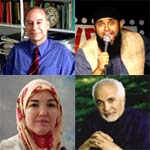Ahmad wasn't so much scared as confused.
"I thought rock musicians were supposed to break their own instruments," he said with a smile.
Little did they know at the time, but those fundamentalists helped spawn an international star whose faith-based music reaches millions of Muslims, prompting comparisons to another do-good rocker, U2's Bono. Perhaps more important, by promoting interfaith understanding, Ahmad has become a pivotal figure in the war between moderate and extremist Islam.
"That one incident really changed the way I started thinking. I realized that if there are some people who feel threatened by music, and what music means for people, then I should do more of it," Ahmad, a devout Sufi Muslim, said in an interview.
Ahmad, 41, is best known as lead guitarist of Junoon, a Pakistani-American rock band that is wildly popular throughout South Asia and among the South Asian diaspora, selling 25 million albums -- as many as Nirvana, ZZ Top and Janet Jackson have sold in the United States. Many of his songs have topped MTV India's music charts for weeks on end.
But fame was never enough for Ahmad, who has parlayed his popularity into lobbying for Third World development and building bridges between the Islamic and Western worlds.
"I can't imagine anybody else out there who as a single person can make a bigger difference than Sal," said Polar Levine, a Jewish-American musician with whom Ahmad has collaborated since the Sept. 11 terrorist attacks. "He's not making music as a sales unit or to get babes. He's got an agenda."
Born in Lahore, Ahmad moved with his family to Tappan, N.Y., when he was 12. There he grew to love Led Zeppelin and Pink Floyd, and bought his first guitar. He also maintained his Pakistani-Muslim roots, speaking Urdu at home, fasting during Ramadan and perusing the Qur'an. Ahmad returned to Lahore for medical school and after graduating chose music over medicine, figuring that if he failed at rock 'n' roll he could always go back to doctoring.
He never picked up a stethoscope again. Junoon, which Ahmad formed in 1990, created a distinctive sound -- electric rock braided with Pakistani folk music and lyrics that drew from the Qur'an and Sufi poets like Rumi and Baba Bulleh Shah. He quickly won a following that grew over the years.
"My inspiration comes from a lot of these Sufi poets, and the fact that they saw the world as one," Ahmad said. "I'm a believer, and a lot of my music and my life take inspiration from faith. And the Qur'an is a huge source of inspiration."
Despite his deference to Islam, not all Muslims approve of Ahmad and Junoon.
"Islam needs musicians like Ahmad ..."
Read more on page 2
| _Related Features | |
|
|
|
 |
They couldn't, but still held to their views.
Imam Yahya Hendi, a Muslim chaplain at Georgetown University and member of the Islamic Fiqh (Jurisprudence) Council of North America, says there is "absolutely nothing" in the Qur'an or Hadith (the sayings of the Prophet Muhammad) that prohibits music.
On the contrary, Islam needs musicians like Ahmad, perhaps even more than it needs religious leaders, Hendi says.
"Music is a universal language. Every human being connects with it. Not everyone connects with religious voices. Musicians can put out the message that Islam is a religion of love, compassion and peace better than clergy," he said.
A second BBC documentary, "It's My Country Too," follows Ahmad as he visits American Muslims living in post-Sept. 11 America. Ahmad has been showing the film at college campuses across the country to promote discussion about fighting extremism and developing dialogue between people of different faiths. He says the vast majority of Muslims are moderate, but that they need to do a better job of explaining their religion.
"Everybody says, `It's a religion of peace.' Well, all religions are religions of peace. But what does your identity stand for?" he said.
Ahmad's identity has been shaped by October's devastating earthquake in the disputed territory of Kashmir. It claimed nearly 90,000 victims, including Ahmad's aunt and cousin.
The tragedy has put Ahmad on a fundraising tour, including a concert in Norway that helped secure a $25 million pledge from that country's government. He was critical of the Pakistani government's hesitancy to accept aid from Israel, a country it doesn't recognize. "We have to get out of this mind-set of the politics of division," he said. "When there's a tragedy, you've got to do what's required."
Rather than shaking Ahmad's faith, the earthquake has reinforced it, crystallizing what he's learned as a Sufi, he said. He sees a need for peace between India and Pakistan, who have fought three wars over Kashmir.
"This earthquake shook the land for a couple of minutes, and those couple of minutes show, you know, whose land is it. And if something good could come out of this, it would be that both of these countries move towards a peaceful resolution of their conflicts, because those people need help right now. There's no Muslim, there's no Hindu, no Sikh, no Christian right now. They're just human beings who need help."
| _Related Features | |
|
|
|
 |

